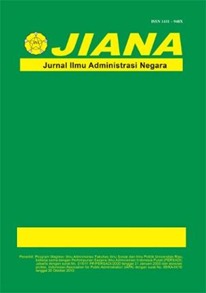EFEKTIVITAS SISTEM MANAJEMEN INFORMASI KEPEGAWAIAN
DOI:
https://doi.org/10.46730/jiana.v17i2.7889Keywords:
effectiveness, information systems, personnel managementAbstract
Effectiveness of Staffing Management Information Systems. The purpose of this
study was to determine the effectiveness of SIMPEG in Pekanbaru City BKPSDM and find out
the inhibiting factors. This study uses a qualitative descriptive research method approach.
Primary data is obtained directly through interviews from key informants, namely the Head of
BKPSDM, Secretary of BKPSDM and BKPSDM Staff. Secondary data obtained from research
documents. Data analysis through stages, starting from data collection, data reduction, data
presentation and conclusion drawing. The results showed that the effectiveness of the Civil
Service Information System (SIMPEG) in the Human Resources Development and Human
Resources Agency of the City of Pekanbaru was influenced by input, process and output.
Information technology elements cannot be released in relation to the implementation of
SIMPEG. Synergy between technology and its implementation by employees can be seen from
the implementation of procedures and system workflow processes which include input subsystems,
process sub-systems and output sub-systems.
References
Hartono, Bambang, 2013. Sistem Informasi
Manajemen Berbasis Komputer.
Jakarta: Rineka Cipta.
Kadir, Abdul, 2010, Pengenalan Sistem
Informasi, Andi. Yogyakarta
Kartaprawira, Rusadi. 2010. Pendekatan
Sistem dalam Ilmu-ilmu sosial.
Bandung: Sinar Baru
Kumorotomo, S. A Margono. 2011. Sistem
Informasi Manajemen dalam Organisasi
dan Organisasi Publik, Yogya -
karta, UGM Press
Musanef. 2011. Manajemen Kepegawaian
Di Indonesia. Jakarta:CV. Haji
Masagung.
Sutabri. T, 2010, Sistem Informasi,
Yogyakarta: Andi
Siagian Sondang P., 2012, Sistem Informasi
Manajemen, Bandung: Bumi
Aksara
Rusdiana, M., & Moch. Irfan, S. M. 2014.
Sistem Informasi Manajemen.
Bandung: Pustaka Setia.
Downloads
Published
How to Cite
Issue
Section
License
The copyright of the received article shall be assigned to the journal as the publisher of the journal. The intended copyright includes the right to publish the article in various forms (including reprints). The journal maintains the publishing rights to the published articles.
Authors are permitted to disseminate published articles by sharing the link/DOI of the article at the journal. Authors are allowed to use their articles for any legal purposes deemed necessary without written permission from the journal with an acknowledgment of initial publication to this journal.

Jurnal Ilmu Administrasi Publik is licensed under a Creative Commons Attribution-NonCommercial-ShareAlike 4.0 International License.




